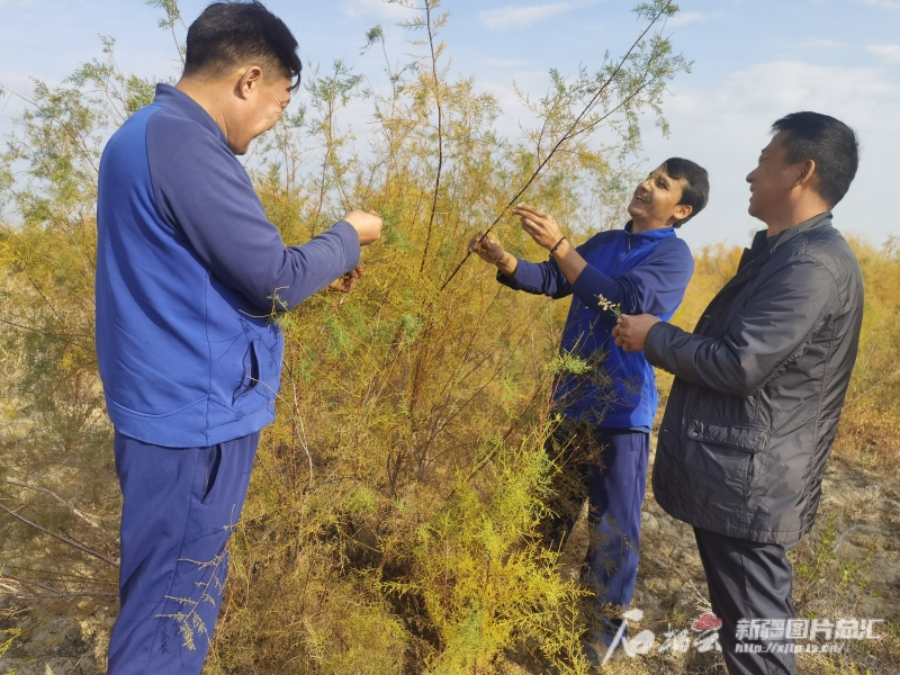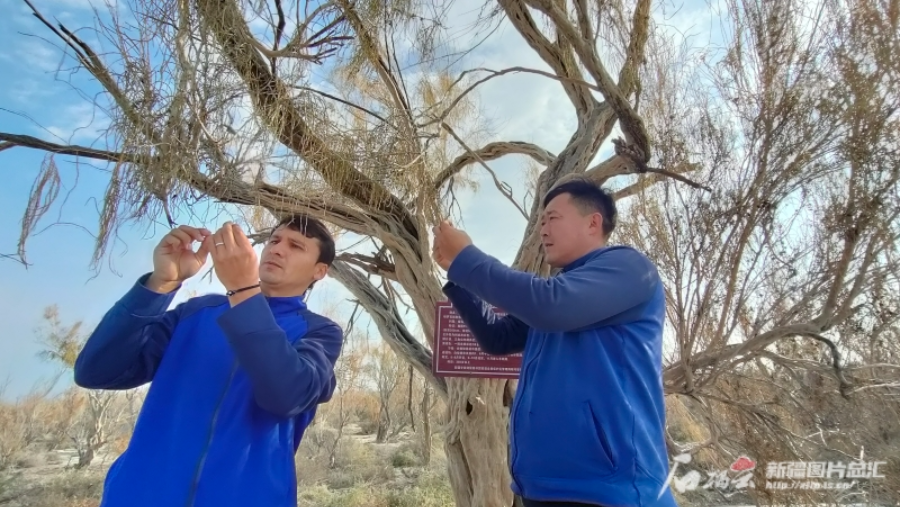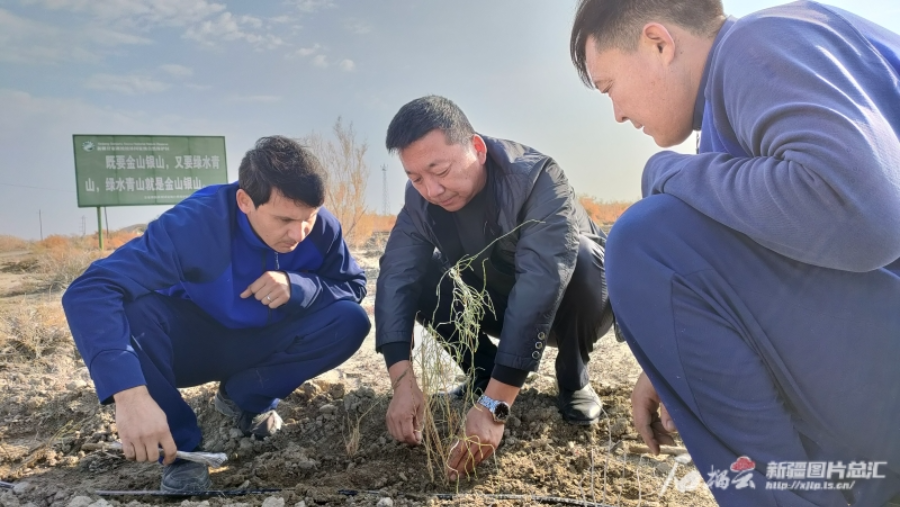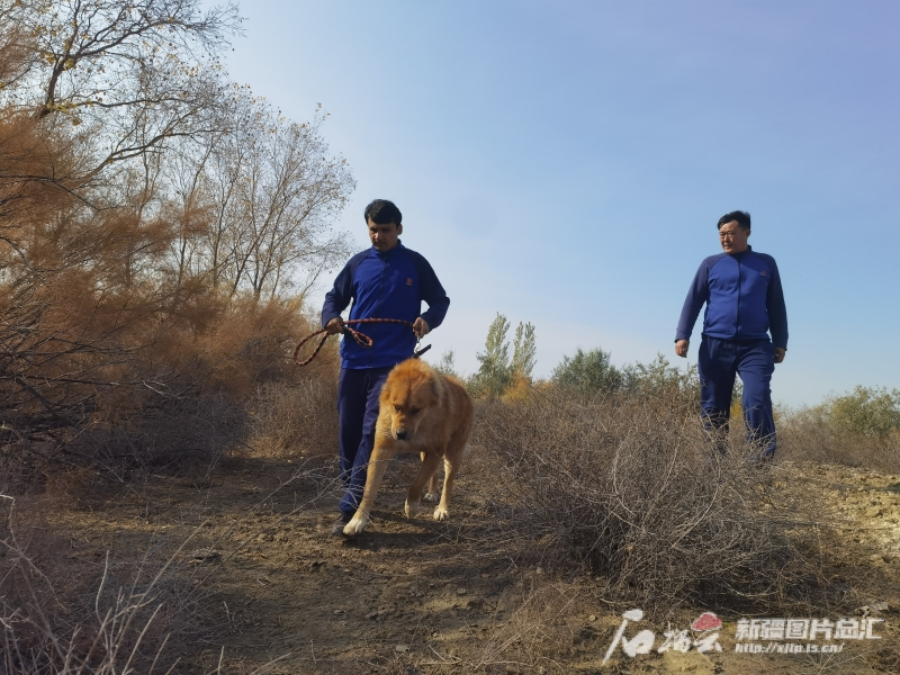Shiliuyun-Xinjiang Daily (Reporter Bai Sujun) news: On October 24, 2024, the morning in Jinghe County, Bortala Mongolian Autonomous Prefecture, northwest China's Xinjiang Uygur Autonomous Region, was filled with a biting chill. Traveling north from the urban area towards the southwestern part of the Junggar Basin, after more than 90 kilometers of bumpy travel, vast expanses of white saxaul and poplar forests came into view, marking the entrance to the Ganjiahu Saxaul Forest National Nature Reserve in Xinjiang.
The nature reserve was established in 1983, covering an area of 820,000 mu (about 54,666.67 hectares), with 12 stations and over 60 ecological forest rangers. As the largest and most intact white saxaul forest nature reserve in Asia, it serves as a natural barrier against the sandstorms from Ebinur Lake.
Over the past 41 years, generations of forest rangers have taken on the tasks of forest fire prevention, wildlife protection, and management of forest and wasteland resources within the reserve, contributing to the prevention of the Gurbantunggut Desert's southward encroachment. Today, the desert has been clothed in green, with ecological conditions continually improving. The vegetation coverage rate has reached 67.41 percent, and various wild flora and fauna populations are thriving and growing, filling the area with vitality and dynamism.
The Post-70s ranger with a commitment to the reserve
The reporter visited the Wudaoquan forest protection station of the Jinghe Management Bureau at the Ganjiahu Saxaul Forest National Nature Reserve, experiencing the work and daily life of forest rangers from different eras.
"The footprints of the goitered gazelle are heart-shaped, the wild boar's footprints are round, and the wolf's footprints are plum-shaped, with its nails longer than a dog's..." At 10:30 a.m. on October 24, Zhao Wei stood in the courtyard, vividly sharing his experience in identifying wildlife tracks with his colleagues.
As the station chief of the Wudaoquan forest protection station, 51-year-old Zhao is known as a "walking encyclopedia" among his peers, and everyone likes to consult him when they encounter difficulties.
Zhao told the reporter that the work of the forest rangers at the protection station is very hard.
Zhao recounted his experiences from his early days as a forest ranger: 31 years ago, encouraged by his father, he became a ranger of the forest. Back then, without access to water, they would search everywhere for a water source and carry it back in wooden buckets; lacking houses, he and his colleagues would gather tools to build two adobe rooms; without vehicles, they would lead sheepdogs, pack food, and patrol on horseback; it was common not to return home for ten days or half a month.

Photo taken on October 24, 2024 shows Zhao Wei (first from the right), the station chief of Wudaoquan forest protection station, along with colleagues Ji’ensi Tuohutabayi (first from the left) and Xianmuxi Saibule (center), are delighted to see the dense growth of tamarisk this year. (Photo by Shiliuyun-Xinjiang Daily/Bai Sujun)
"In the past, herdsmen had poor ecological awareness, and the damage to plants from overgrazing and digging was severe. Encountering sandstorm weather while patrolling outdoors makes the working environment even more harsh," Zhao said. At that time, communication was underdeveloped, and there was little entertainment, so many colleagues couldn't stand the monotonous life and chose to leave.
Once, during a patrol, Zhao broke his arm. His mother, heartbroken, urged him to change jobs. His father was adamantly against it, saying that a man should have a sense of responsibility and the ability to endure hardship.
Over 30 years have passed, and he has become mature and composed. After becoming the station chief, he has more concerns, but his parents and wife took the initiative to take care of their daughter, allowing him to devote himself fully to his work.
"Every patrol is a passionate confession to nature. In my heart, protecting nature is as important as loving my daughter. It requires sincerity and genuine feelings without expecting anything in return," Zhao said. Nowadays, they use infrared cameras, high-altitude monitoring platforms, drone patrols, vehicle patrols combined with manual foot patrols, and other methods to ensure that the reserve has no blind spots in inspection and monitoring, and no blind angles in forest fire prevention. Seeing wild animals frequently appear and wild plants thrive, he feels very proud and satisfied.
The Post-80s ranger with intimate knowledge of ecology
Ji'ensi Tuohutabayi, is a 38-year-old forest ranger who speaks eloquently about his patrol work. With a background in herding and auxiliary police, he has a strong adaptability and quick response to various tasks at the protection station.
Over the five years he has been working, Ji'ensi has become intimately familiar with the areas where wildlife is most active, which regions have a high population of birds and pheasants, what kind of plant seeds they prefer to peck on, and which patches of saxaul forest have the most flourishing wildflowers. He said, "Forest rangers practice a cross-patrol system, so we are all familiar with the areas each other is responsible for." He mentioned that the land before him bears the footprints and sweat of him and his colleagues, and they have gained a happiness that money cannot buy. The frequent encounters with wildlife during work indicate that the ecological environment is improving.

Photo taken on October 24, 2024 shows forest ranger Xianmuxi Saibule (left) and Ji'ensi Tuohutabayi (right) together observe the flowering and fruiting conditions of this year's white saxaul. (Photo by An Xiaolong)
Ji'ensi said that last month, during a patrol, his motorcycle broke down. As he was bending over to check it, suddenly a wild boar leaped out from the bushes by the road. They both froze, stared at each other for a moment, and then the wild boar took off running.
“It was a young one. If we encounter wild boars suddenly during our patrols, we first stay calm and observe their movements. Generally, as long as we don't provoke or startle them, wild animals won't attack humans," Ji'ensi explained.
Another time, Ji'ensi and his colleague were chatting when a group of red deer had quietly entered the yard to graze. "Our protective fences and barbed wire are often damaged by collisions with wild animals. It's common for badgers to steal melons near the dormitory at night, and for Tarim hares and goitered gazelles to come foraging. When red deer and goitered gazelles are in danger or being chased by wolves, they often seek refuge in our dormitory area," he said. A few days ago, when he went outside the dormitory yard to use the restroom, he encountered a wild boar. Fortunately, a sheepdog came to his aid just in time, and he and his colleague were unharmed.
"Now, we have a good understanding of the habits of the wildlife in our area, and everyone has learned various defensive skills, which helps us coexist more harmoniously with them," Ji'ensi said. He plans to learn more about plants in the future, to tell his children more stories about animals and plants, and to "show off" a bit in front of his wife and parents.

Photo taken on October 24, 2024 shows Zhao Wei (center), the station chief of the Wudaoquan forest protection station, explains the precautions to be taken when planting saxaul seedlings in the fall to forest rangers Ji'ensi Tuohutabayi (right) and Xianmuxi Saibule (left). (Photo by An Xiaolong)
Forest ranger Maerpati Mahemuti said that Ji’ensi is a "living map" in their eyes, familiar with every patrol route, and can quickly discern directions even when someone gets lost at night. Additionally, he handles situations like drones falling into the jungle with ease.
The Post-90s ranger with a passion for plants
As the conversation continued, the 31-year-old forest ranger, Xianmuxi Saibule, returned with a bounce in his step. This lively post-90s man often joked with the reporter, and he enjoyed using internet slang in his speech. "When I first came here, I loved listening to the masters' stories about who encountered more wild animals on patrol. Now, I compete with them to see who knows more about plants, and many can't beat me. It's so much fun!" he said with a smile.
Flipping through the first page of Xianmuxi's patrol diary, it reads: "Youthful days should be dedicated to the most worthwhile things." "Now, guarding these saxaul forests is the most meaningful thing to me," he said.
Xianmuxi also likes to show off his skills; he is proficient in preparing dishes, herding, decorating, painting, cooking, and car repair. "People only shine when they live in their passion. If you have enough strength, be enthusiastic, and you can illuminate others with your light," Xianmuxi said. Since he was a child, he has loved plants. Now, working at the protection station and combining his job with his hobby, he is confident in making a difference.
Whenever he has spare time, Xianmuxi squats on the ground to observe the flora. He educated the reporter on plant science: "Saxaul and Populus euphratica are the most drought-resistant, with developed roots that can prevent wind erosion and retain soil and water. Tamarisk branches are very flexible, and animals love to eat its tender leaves. Cistanche and Cynomorium are traditional Chinese medicinal herbs, effective for invigorating the spleen and kidneys. And licorice root is good for expectorating and relieving coughs..."
"Every plant is a 'child' of the earth, and the flora in the desert are more resilient than those in ordinary environments. Whether walking or on daily patrol, I never step on them," Xianmuxi said. He has hundreds of plant photos saved on his phone, which he enjoys looking at in his free time. These plants have made him strong and brave, and the unity and mutual assistance among colleagues at work make him feel the beauty and kindness. He has also rescued injured wild animals on his patrols, experiences that have contributed to his continuous growth.
In case of snowy and windy weather, Xianmuxi and his colleagues take their trained sheepdogs on patrol. "The number of wild animals in the reserve is increasing, and they are most active at night. With these two trained sheepdogs, we feel very safe," he said.

Photo taken on October 24, 2024 shows forest ranger Xianmuxi Saibule (left) and Ji'ensi Tuohutabayi (right), leading their sheepdogs, pass through the woods and, upon discovering numerous wild boar tracks, quicken their pace. (Photo by Shiliuyun-Xinjiang Daily/Bai Sujun)
"I want to leave my best youth in the nature reserve. It's a precious spiritual wealth, worth remembering forever," Xianmuxi said, adding that listening to the birds sing and watching the flowers and grass every day brings countless joys. "If I could choose again, I would still want to be a forest ranger, contributing to the protection of nature," he said resolutely.
Hao Tuanjun, the Party branch secretary and deputy director of the Ganjiahu Saxaul Forest National Nature Reserve Administration, said that since 2017, the reserve has implemented projects such as returning grazing land to wetlands, leading to a continuous optimization of flora and fauna resources. Currently, there are more than 300 species of wild animals and plants.
(A written permission shall be obtained for reprinting, excerpting, copying and mirroring of the contents published on this website. Unauthorized aforementioned act shall be deemed an infringement, of which the actor shall be held accountable under the law.)









